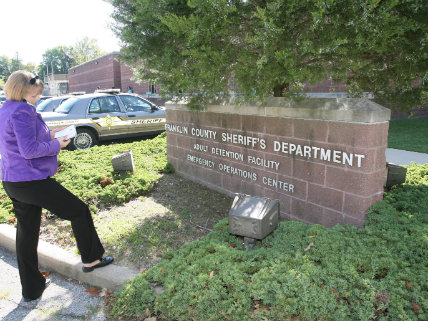Missouri Cop Coerced Drug Treatment Patients Into Becoming Informants, Lawsuit Says
A federal lawsuit accuses a former regional drug task force commander of pressuring patients in drug treatment to become undercover sources.


A former high-profile narcotics task force commander in Missouri allegedly coerced patients in a court-ordered drug treatment into becoming undercover drug informants, according to a federal lawsuit filed this month.
According to the lawsuit, filed by the owners of the Meramec Recovery Center, Franklin County Sheriff's Lt. Jason Grellner used patients at the facility as informants and, when confronted, attempted to influence the local court system to terminate the center's contract. The St. Louis Post-Dispatch reports:
[The lawsuit] says that at some point in 2013 or before, Grellner began using participants in criminal investigations by threatening to get them kicked out of the program if they didn't cooperate. It also says Grellner was motivated by a desire to rid the county of drug crime and get elected sheriff.
Use of participants as informers forced them to associate with drug users and drug dealers, making success in the program more difficult, the suit says.
It also claims Grellner used participants as campaign aides.
The suit says that after Ken Allen noticed that participants were failing drug tests and missing counseling sessions and drug court dates, he confronted Grellner.
Grellner and then Assistant Prosecuting Attorney Jennifer Bartlett met with OSCA to persuade the court system to terminate Meramec, and spread false rumors, the suit says.
OSCA did end the agreement with Meramec nine months early, effective in September 2013. The suit does not say if the Allens were given a reason.
Grellner, who was formerly the head of a regional drug task force, denied the allegations to the Post-Dispatch, calling them "100 percent incorrect" and an attempt to hurt his campaign for sheriff, which he lost this month.
Undercover informants are a key part of the drug war, and police sometimes go to extreme lengths to cultivate them. News investigations over the past several years revealed police in Mississippi and Alabama pressured college students into becoming drug informants.
It's also an irresponsible practice that puts citizens into dangerous and sometimes fatal situations. A Minnesota college student who acted as an informant for a regional drug task force was found shot dead in a river last year. In 2008, 23-year-old Rachel Hoffman was killed in a botched drug buy orchestrated by Tallahassee police.
As I reported for BuzzFeed, the Justice Department Inspector General released a report last year finding that the Drug Enforcement Administration had paid out millions of dollars in workers compensation benefits over the past decade, with no legal basis, to the families of killed or injured drug informants. Exactly how much was paid out is unknown, because the DEA and Department of Labor did not track the payments.


Show Comments (10)